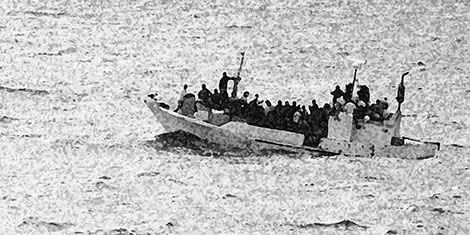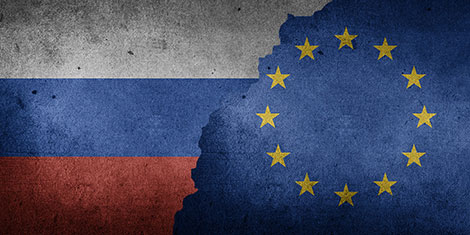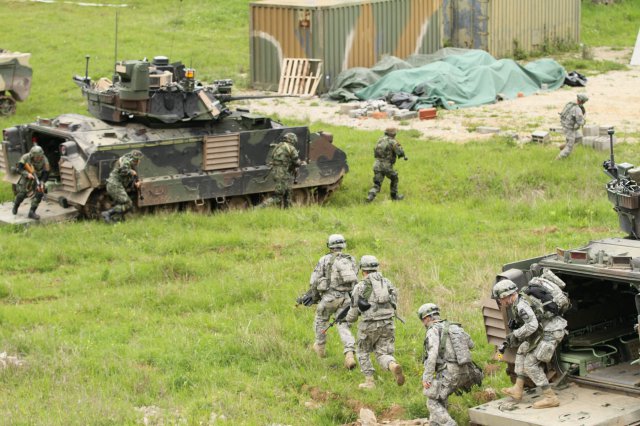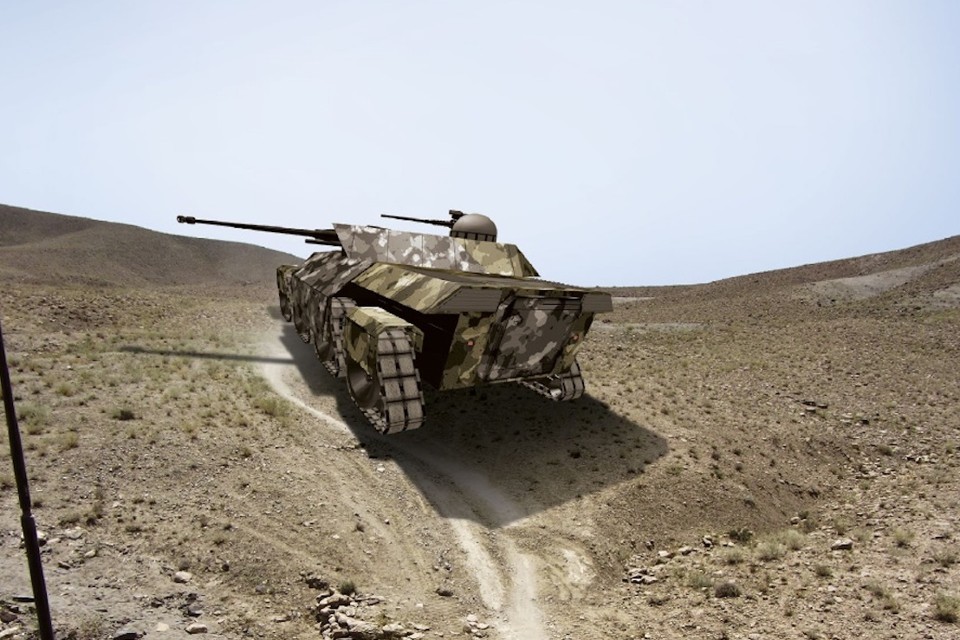On 27 October 2017 I attended a discussion on A World in Flux: The Atlantic Community, West Asia, Indo Pacific at Brooking India. The Panelists were Gen John R Allen, former Commander of International Security Assistance Force in Afghanistan and the newly appointed President of Brookings Institution and Strobe Talbott, recently retired President of Brookings. The discussion was moderated by Dhruv Jaishankar adroitly. I was impressed by the plain speaking and depth of knowledge of the Ex Marine Corps General.
Discussions were on Europe, West Asia and Asia Pacific with an interesting ‘Q’ & ‘A’ session. The gist in reproduced below.
Europe
Does Altantic community Exist? As per Talbott it still exists. However it is like a see saw, sometimes up, other times down. Now it is in downswing. Earlier it was all about integration in Europe. Now it is disintegration on the avail : Catalonia in Spain, Brexit and UK out of EU, UK itself may not be united. Russia is reintegrating, expanding, using geopolitical instruments of hard power. It is influencing the minds of responsible leaders of Europe. US is particularly concerned as it is committed to 70 years old legacy in Europe. Regarding Ukraine US never changed the goal past in between. There was lot of support in NATO specially in Germany that NATO should move East. After disintegration of Soviet Russia number of countries wanted open society, democracy based on values. Earlier they were frightened. President Clinton’s policy was not to contain Russia but maintain stability and allow growth of democracy. I felt Friedman and Kaplan’s hypothesis were correct. The geopolitical compulsions would never allow Russia to have NATO right at its doorstep where he is most vulnerable.
Did Ukraine make a mistake in giving up nuclear weapons? Talbott felt that Ukraine’s refusal to let go nuclear weapons would not have stopped Russia do what it did after Sochi Olympics. Russia have lots of assets to make nuclear weapons unusable by the Ukraine Govt.
Personally I would differ. Till date no two nuclear powered nation have gone to war. Look at North Korea. Certainly it would have been a great deterrence.
Russia
Russian economy is presently approximately half of Indian economy. Why give too much of credence to Russia?
Russia territorially is the largest state on planet. Qualitatively and quantitatively it is a great military power. It has a large number of nuclear weapons. Bad news is, Russia is going back to failed reforms of earlier Soviet Union days. It’s economy is totally reliant on hydrocarbon resources. It has no sophisticated service industry. Its manufacturing base cannot even service Russian people. President Putin is going to leave a fatal legacy to his successor.
Demography. Russian population is 75 to 80% Slovaks. They have negative growth rate in population. There is a sizeable Muslim population, mostly Sunni, who have different ethnicity, high degree of Arab negativism. This population is booming. Location of this population is also important. Sooner than later Russia will have to address this issue.
If you look at the map of Russia and try to see from where the threat is coming, the least threat would be form West. Move of Polar ice cap, Arctic are not such big issues.
Russia is actively involved in fighting in Syria. Number of ISIS fighters from Syria, Iraq, Afghanistan etc are expected to go back to Russia and create problems.
The greatest geopolitical threat to Russia is China. The eastern provinces are rich with resources and poor with people. China needs resources, land. Is hungry for these. This is recipe for big trouble for Russia.
Middle East
There has been no external policy in Middle East which has been a total success, there have been spectacular failures. Today there is a new Cold War between Saudi led Sunni elements Vs Persian led Shia elements. Almost all problems in Middle East region would have some elements of the new Cold War.
After about 100 years of collapse of Ottoman empire and aftermath of Arab Spring the structural weaknesses in Middle East is apparent. System of governance is weak or non existent, was never put into place. The people of Middle East never chose the borders, it was always imposed by colonial powers from outside keeping their interests in the forefront. European powers did not do any better in controlling the region considering their history, culture, faith, tribe, type of governance etc. The region continued to simmer and in December 2010/early 2011 there was an uprising of youthful elements specially in dictatorial/tribal regimes. Al Qaeda quickly got into the act and justified jehadi salafis. The social media accelerated the revolts as never seen before. The European Governments failed miserably in controlling the situation.
Today look at the region. There are civil wars going on. Syria symbolizes how bad it can be. Situations at Turkey, Jordan, Egypt, Libya have stabilized.
The enormous number of refugees destabilizes Europe. The polarization of extreme right wing politics is taking place aided by highly sophisticated influence operations by Russia. The situation is likely to get worse.
Qatar
Both sides may reach exhaustion. USA is friend of both sides. Qatar may be moving closer to Iran. There is a reintroduction of Turkey’s influence. The Arabs may not be very happy with that. The GCC is permanently wounded in this conflict.
The USA must have a policy soon which gives its friends in this region some hope in the community of nations. There are human factors, faith of Islam, Jihad, governance, no equal right to women, zero economic prospects, absence of leaders etc. The nations in this region cannot solve the problem themselves. There is a chance of massive radicalization of young people in the region. We have to swim upstream, identify causal factors. The issues of governance say in tribal societies, and other generational issues are complicated but must be addressed.
Iraq. Is a complex issue. Prime Minister of Iraq wants increased federalism. The Kurd issue was explained in great details. Thanks to my paper in my blog on Kurds available at : http://strategicstudyindia.blogspot.in/2017/10/the-time-of-kurds.html I could understand the complexities.
Abadi wants to demobilize Shia groups in the North and absorb the rest. Mosul could not have been liberated without the help of Shia groups and Kurds. Iraqi army was missing in action. Now with Daesh demolished if we do not get the political outcome right very soon shooting will start again.
Independence of Kurds may take some time. Now is not the time.
US Armed forces are continuously at war since 9/11 for last 17 years in multiple theatres ain stressful conditions.
Even when Daesh is defeated physically it will spread out in small groups to different parts of the world, is a big worry. Daesh has symbiotic relations with highly sophisticated criminal gangs. It is the phase four peace. Example of Germany, Korea, Japan, Europe after second world war. For a considerable time Govt of South Korea was corrupt. Look at the powerful economy of South Korea now. It still has 28000 American soldiers there.
You can win war but lose peace. It is the political and economic outcomes post decisive wars which are most important.
Afghanistan.
America was one and half year away from handing over responsibility of Afganistan. The training of the Afghan forces were under way. But a political decision was taken. From 1.5 lakh soldiers it came down to less than 10,000. From 835 bases it it was 12 bases.
There was a question on changing nature of warfare. You could see it was the Marine Corps General’s turf. It was a fascinating expose. Nature and character of war – their interplay. Character is associated with technology, when nature and character of war is in synch coherent military strategy is created. How the Germans got the Blitzkrieg right by integration of capabilities of fast moving armd vehicles, radios, dive bombers, how the British decimated the Italian fleet, using old slow aircrafts swordfish, how the Japanese learned from this British attack to plan on Pearl Harbour on 7th December and how the US Navy refused to learn from the Taranto attack. Those interested in Taranto may like to read : http://nationalinterest.org/blog/the-buzz/year-before-pearl-harbor-the-british-sank-enemy-battleships-18693?page=show
Russians are showing how to adapt. Their influence operations are remarkable undermining confidence of population. They are influencing the Presidential elections in USA!
Advancement of Artificial Intelligence (AI), Autonomous systems are posing difficult questions how the warfare would be fought in future. Interested people can read my blog article on fourth industrial revolution and military implications at http://strategicstudyindia.blogspot.in/2017/10/defence-implications-of-emerging.html ,
http://strategicstudyindia.blogspot.in/2017/10/10-trends-for-future-of-warfare.html , http://strategicstudyindia.blogspot.in/2017/10/key-emerging-technologies.html and
China has already invested $ 150 billion on research of AI. These emerging technologies are going to change the character of warfare.
Hyper war was also discussed.
Shri Manoj Joshi of ORF asked a very interesting question. India’s 70% hydrocarbon comes from West Asia/ Middle East, we have a huge population in these areas, we have great interest here. But USA does not collaborate with us in this region. Gen Allen was remarkably candid in answering. He finds no reason why the task force in this region is headed by Pak Navy when Indian Navy has its presence for anti piracy operations.
Taking a cue I asked the General the following :
The inter command boundary between US Central command ( CENTCOM) and Pacific command(PACOM) is along Indo Pak border. We come under PACOM which is far from us, the action is here in our western neighbourhood and western sea board. Can the inter command boundary between CENTCOM and PACOM be shifted eastword so that India comes under the influence of CENTCOM.
Robert Gates as Secy Defense while addressing US Military Academy stated that US Armed Forces has been consistently correct in only one thing ; Failing to predict the nature of next war, they always prepared for the last war. Today the leaders of US Armed forces are wary of their unpreparedness to fight under intense EW environment, the Russians are way ahead, their communication networks may not work, GPS may malfunction. At the same time the present counterinsurgency and counter terrorism operations will also continue. Is there any dichotomy inpreparing for the next war. The response of Gen Allen was fascinating.
On the whole a very good discussion. I was enriched.












